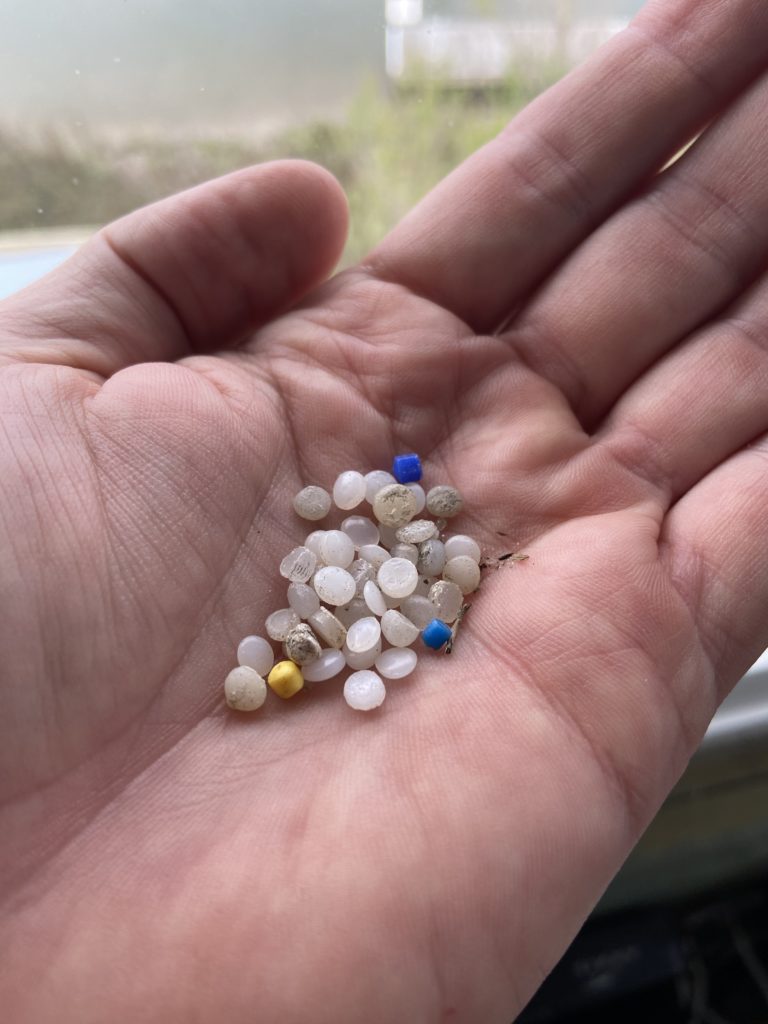Beating Back the Tide of Nurdle Pollution with Charleston Waterkeeper
By: Thomas Hynes

A pernicious and increasingly common form of plastic pollution comes by way of the innocuously named nurdles, the lentil-sized “pre-production pellets” that serve as the building blocks for plastic products. There was recently an article in The Guardian about the nurdle problem. However, our own Charleston Waterkeeper, Andrew Wunderley, has been in the news fighting this emerging scourge of plastic pollution for quite some time.
It began when a supporter reported the spill to Wunderley. Nurdles — a lot of them — had washed ashore on the beaches of Sullivan Island, a barrier island near Charleston, South Carolina. That he found so many speaks to one of the big problems with nurdles: they are very small. It means they can easily slip from shipping containers or production facilities and find their way to the beach, to the water, into fish, and just about everywhere else.
So Wunderley began collecting nurdle samples. Sadly, he didn’t have any trouble finding any. (He keeps the samples in glass jars, instead of the cheaper plastic ones.) Eventually, Charleston Waterkeeper traced the nurdle spill to a local shipping company. The company would not initially admit blame for the spill, but they nonetheless paid to clean up the nurdles on Sullivan Island by hand.
Of course, the nurdles didn’t stop there. Attempting to clean them up can prove to be a bit Sissyphean. There are also larger market forces at play here. In particular, the overabundance of natural gas in the United States has made plastic production soar. In other words, it was the fracking boom that led to the increase in plastic production — and by extension the prevalence of nurdles — and not consumer demand from the free market. It helps explain why half of the plastic ever made was created in the last decade.
The seemingly unending supply of these little plastic beads that Wunderley collected would eventually serve as evidence in a lawsuit that Charleston Waterkeeper, along with the Southern Environmental Law Center and the South Carolina Coastal Conservation League, successfully brought against that local shipping company. As part of the settlement, $1 million is being paid to the Coastal Community Foundation fund in support of local grants and projects. The company also agreed to inspections and any necessary upgrades.
It was a great victory for Charleston Waterkeeper and the Clean Water Act, but the threat from plastic pollution persists. The watershed, and its harbor, sits in the middle of the transport phase of the nurdle’s journey to market. But, really, nurdles are a mess at every point in the life cycle. Diane Wilson of San Antonio Bay Waterkeeper dealt with nurdle pollution at the production stage.
Wilson, along with others, successfully sued a nurdle-polluting company in Texas. One of the other plaintiffs in that case was Jace Tunnell, from University of Texas, who would subsequently go on to create Nurdle Patrol, a crowdsourced database and sampling protocol to help anyone monitor their areas for nurdle pollution.
This standardized methodology for counting helped Wunderley pinpoint nurdles, usually based on their color or discoloration, and establish where they came from and how long they have been out in the ecosystem. Nurdle Patrol offers a starter kit which can help Waterkeepers, schools, and any other concerned citizens get involved in protecting their watershed from pollution.
“Nurdle Patrol makes it really easy, but you can get started anytime. I would encourage people to get out there and look at high tide and see where the debris collects,” says Wunderley. “Once you start looking, you’ll quickly know if you have a problem or not. It’s super easy to do, and it’s a great way to engage your community and get them involved.”
Increasingly, Waterkeeper Organizations and Affiliates around the world are encountering nurdles in their watersheds. Rachel Bartels of Missouri Confluence Waterkeeper has found nurdles in the course of her routine microplastics testing, predominantly in Kansas City, MO at the confluence of the Kansas River and the Missouri. She plans to do more targeted testing in the coming months.
Eric Harder of Youghiogheny Riverkeeper has also begun to encounter nurdles in his watershed near Pittsburgh. In fact, it was a call to Wunderley at Charleston Waterkeeper that got Harder started in his own monitoring.
Unfortunately, the nurdle problem isn’t going away anytime soon. But, luckily, Waterkeepers are helping one another deal with this emerging threat. To learn more about Charleston Waterkeeper’s fight against nurdle pollution, click here. To learn more about monitoring and tracing nurdles in your own watershed, visit NurdlePatrol.org.